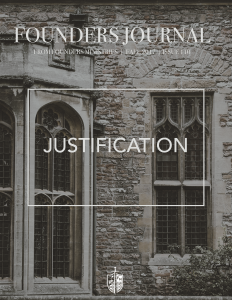Editor’s Introduction
Benjamin Keach (1640–1704) became a Baptist at age 15, preached as a General Baptist, and suffered persecution, imprisonment, and the pillory for his convictions as a Baptist. After serving as an elder in a General Baptist congregation from 1668-1672, he became a Particular Baptist minister and founded the church at Horse-lie-Down in Southwark in London. He spent the remainder of his years as a zealous preacher of the gospel, an effective polemicist, a theoretician on principles of biblical interpretation, a poet, a hymn-writer, and a writer of allegory. His clear and bold defense of the doctrines of grace was informed by his previous years as an Arminian. He lived with sincere conviction that the doctrine of justification by faith was indeed the doctrine on which the church stands or falls. His sermons and expositional writings were filled with explanations of the centrality of this doctrine to a proper understanding of the grace of God.
In an exposition of Luke 7:42, “And when they had nothing to pay, he frankly forgave them both,” Keach had an applicatory section explain how grace reigns through righteousness. Grace is not elevated in an unjust way or unrighteous way but reigns through righteousness. It certainly does not reign through our righteousness for our very unrighteousness makes grace necessary. Rather chiefly grace reign “through the righteousness of Christ, or through His perfect and complete obedience, or that righteousness He wrought out, by doing and suffering. It was through the righteousness of Jesus Christ that grace reign; for without this righteousness, neither holiness, justice, nor the holy law would let grace reign.” Before, divine justice was on the throne pronouncing merited judgment on justly condemned sinners. Now, however, the law has been obeyed in perfection. Divine wisdom, on that basis, has devised a way for grace to adorn all the divine attributes so they shine forth in equal glory operating under the anointing of grace. The reign of grace through the righteousness of Christ finds its most gripping manifestation through “the application of what He hath done and suffered for us; His merits are applied, and His righteousness is imputed to every one that believeth in him, as an act of sovereign grace.”
The narrative below shows the intensity with which Keach proclaimed and applied the doctrine of justification by grace through faith in Christ as the righteous propitiatory sacrifice.
Application of The Marrow of True Justification
This reproves all such as go about to eclipse the doctrine of free grace or of justification of Faith only and plead for sincere obedience, and mix Grace and works together. Also it may serve to convince all men, that such teachers, however cried up, are not true gospel-ministers; and therefore should be avoided, though they should speak with a tongue like angels.
1. Caution. Do not think, O Soul, that thy own righteousness doth justify thee, through Christ’s merits; or that Christ’s righteousness is thy legal righteousness, and not thy evangelical. No, no, he is thy whole Savior; it is Christ’s own arm that brought salvation, is not our own righteousness joined or coupled with the merits and righteousness of Christ; but his personal righteousness only received by faith. And,
2. Take heed you do not put Faith itself in the room (as your act, or as a divine habit, or as the product thereof) of perfect obedience; for ‘tis Christ’s righteousness that is put in the place or room of that perfect obedience which God required of us in point of justification: Faith only justifies, in respect of the object it apprehends and takes hold of.
3. Tremble, ye who trust in your moral, or gospel obedience, your acts of mercy, or good deeds, and holy lives. Tremble ye who rest on your duties, who glory in your knowledge, and outward privileges; you fast, and pray, and hear sermons, and so you may, and go to hell at last. Notwithstanding, these things you must do, but yet not seek to be justified thereby; do them as duties in point of performance; but lay them down in point of dependence.
4. Here is comfort for sinners; but if you are self-righteous persons, or go about like the Jews of old, to establish your own righteousness, down to hell you will fall, Romans 10:2. This doctrine will support you that are weak, and doubt for want of inherent righteousness, take hold of it, a robe of righteousness, put it on, believe in Christ, as poor sinners come to him, you that have no money, no worth, no merit, no righteousness, this wine and milk of justification and pardon is for you: cry to God to help you to believe; Christ is the author of your faith, ‘tis the gift of God, ‘tis a grace of the Spirit; do you say you were wounded? Look to Christ, Believe, and thou shalt be saved, Mark 16:16. John 3:15, 16. If thou can’st not come to God as a saint, come as a sinner; nay, as a sinner thou must come, and may’st come.
Obj. But this doctrine is decried for antinomianism.
Ans. They know not what antinomianism is, that they this brand us, as here-after I shall, God assisting, prove. If this is to be an antinomian, we must be all such, and let them mock on; the Lord open their eyes: we are for the law as Paul was, and for holiness and sincere obedience, as any man in the world; but we would have man act from right principles, and to a right end: we would have men act in holiness, from a principle of Faith, from a principle of spiritual life, be first married to Christ that they may bring forth fruit to God, Romans 7:4.
We preach to you, sinners, that Jesus Christ will entertain you, if you come to him, bid you welcome, and not cast you off, because of the greatness of your sins, though you have no qualifications to recommend you to him. Would you wash your selves from your sins, and then come to the fountain of his blood to be washed; we hold forth Christ to be your whole Savior, and that he is set forth as the propitiation through faith in his blood; whom if you close with, and believe in, you shall be justified. We tell you God justifies the ungodly, i.e. that they are so before justified.
Nor is our doctrine any other, than what all sound Protestants have always contended for; nay, which the Church of England and her 39 articles doth assert. Imputed righteousness and justification only for the merits of our Lord and Savior Jesus Christ by faith, and not for our own works and deservings, and that we are justified by faith only; and that works done before the grace of Christ, and the inspiration of the Spirit, or not pleasing to God, for as much as they spring not from faith in Christ, nor do they make man meet to receive grace, &c.
Let me exhort do you not to receive for truth all things that you find asserted in some men’s books, sermons, and writings, though recommended by such man you have so great a veneration for. I hope some of these ministers that have set their hands to Mr. Williams late book, will see calls to repent of their rash act, and great inadvertency; for we cannot see but that they said book brings in another gospel, or is a subversion of the gospel (though the unwary reader may not soon discover the poison that lies hid in it) and ‘tis full of hard, and uncouth, or unintelligible terms, notions, and expressions, not formerly known to the Christian world: ‘‘Tis strange to me that he should intimate and hold forth the gospel to be a law, or command of duty, as a condition with the sanction of threats upon non-performance, and promises of rewards up on performance of sincere obedience; for if sincerity of grace and holiness be not the condition of that which he often calls the rule of the promise, which he nevertheless says is not the precept, I understand him not: Doth he not mean a man must be holy, sincere, or a new creature, before he ventures on the promise of the gospel, or can be justified, which is the error my text opposes; as if the free promise of the grace of God is laying hold on Christ and his righteousness justifies us not but that we must get some inherent qualifications of holiness, as a rule of the promise, before we venture up on it, or throw ourselves up on Jesus Christ, and so must receive him as saints and not as sinners; which is directly contrary to what all our true protestant writers and modern divines have all along asserted. The Papists say, a man must be inherently righteous before he can be declared just; and that Faith justifies, as it infuses such a righteousness in us: and this man says but little else, if I understand him; i.e a man must answer the rule of the Gospel-promise, asserting that the Gospel doth judicially determine a conformity to the rule thereof; and when God forgives, he judicially declares a man hath true faith, and by faith he means doubtless more than laying hold on Christ, viz. The making good the baptismal covenant, i.e. to love serve, and sincerely to yield obedience to the Gospel; so that Faith must by him be taken in a large and comprehensive manner: and that before God declares us righteous to justification, he looks whether or not we have fully answered the conditions (according to the doctrine these man preach) and finding the creature has done that, God judicially gives the promise in a way of reward;. and the obedience being sincere, though imperfect, ‘tis accepted as far forth as perfect obedience would have been (could it have been performed) under the law of works; so that still inherent righteousness is the condition of our justification before the holy God, and not the righteousness of Christ: away with this error.
Brethren, this new law it seems can give life up on obedience thereto, the first being taken away; but if by the law, any law, a man might be justified, Christ is dead in vain: for as one law, so all laws of works since man hath sinned , utterly fail, and are unable to justify us in God’s sight. For as some learned man have observed, the Greek word is not the law but a law. Let it be what law or rule of righteousness it will, that requires perfect or imperfect obedience, it will not do, Galatians 3. 11. For the just shall live by faith: justification and life comes only that way, and not by works of obedience we have done.
And truly to talk of sincere Obedience, when performed by an unregenerate Person, ‘tis strange Doctrine. Sincerity must only be look’d for in him, who is renewed by the grace of God: ‘Tis as impossible for an unregenerate person to perform sincere obedience (if we speak of Gospel-Sincerity) as it is for a believer to perform perfect obedience to the law of works.
Therefore Sinners, though ’tis your duty to reform your lives, and leave your abominable sins, which often bring heavy judgments upon you in this world, and expose you to eternal wrath in the world to come; yet know that all that you can do, will fail in point of your acceptation and justification in God’s sight, or to save your Souls: Your present work and business is to believe in Jesus Christ, to look to him, who only can renew his sacred image in your souls, and make you new creatures, which must be done or you perish. O cry that he would help your unbelief: Come, venture your souls on Christ’s righteousness; Christ is able to save you, though you are never so great sinners. Come to him, throw your selves at the feet of Jesus: Look to Jesus, who came to see and save them that were lost; If any man thirst, let him come to me and drink, John 7:37, 38. You may have water of life freely. Do not say I want qualifications or a meetness to come to Christ. Sinner, dost thou thirst? Dost thou see a want of righteousness? ‘Tis not a righteousness; but ‘tis a sense of the want of righteousness, which is rather the qualification, thou shouldst look at: Christ hath righteousness sufficient to clothe you; Bread of life to feed you, grace to adorn you; or whatsoever you want, it is to be had in him. We tell you there is help in him, salvation in him, through the propitiation in his blood you must be justified, which is by faith alone.
Know that God justifies the ungodly; not by making them first inherently righteous, nor are they ungodly any more after justified: The faith of the operation of God will soon purify your hearts, and cleanse your lives; this grace will teach you to deny all ungodliness and worldly lusts, and to live soberly, righteously, and godly in this present evil world. We do not tell you, you must be holy, and then believe in Jesus Christ; but that you must believe in him, that you may be holy. You must first have union with him, before you can bring forth fruit to God; you must act from life, and not for life.
Obj. But O ‘tis hard thus to believe; to be ungodly, and yet to believe; to see no holiness of our own, no divine habits planted in us; Had we some degree of sanctification, or righteousness of our own, we could then believe.
Answ. Is not Christ able to save you, or is he not willing to save you, unless you ae co-workers and co-partners with him in your salvation? Or are you unwilling to be saved, unless you might share with him in the glory of your salvation? Is it hard for you to believe the highest testimony and witness that ever was born to any truth? Can’t you believe the report of the gospel, or receive the record of his Son? Is resting on Christ hard? Can’t you beg for bread rather than perish? Can’t you drink when thirsty, when you are bid to do it freely?
We say the gospel is not a conditional covenant of obedience; or that faith, and holiness, or faith, and good works, are the condition of it, denying we are justified by any works of ours, as a subordinate righteousness to the righteousness of Christ, or that we are justified for Christ’s sake only, but not that his righteousness is imputed to us also, as our sins were imputed or laid upon him. We say that faith doth not justify as an act, nor as a habit, or from any worth there is in that, it being only a hand to apply the remedy, we say, faith is a fruit of Christ’s purchase; and that He who spared not his own Son, but delivered him up for us all, will much more give us all things, that is, grace here, and glory hereafter. He that gave us the greatest gift, will not deny to his elect ones the lesser gift.
And now know all you Pharisaical persons, this doctrine will pull down your high thoughts and imaginations, and abase your pride.
To you that are believers, Oh! Admire free grace; lift up Christ who died for you, the Just for the unjust, who bore your sins, who was made sin for us that knew no sin, that we might be made the righteousness of God in him. He gave himself for you, and has given grace, the fruit of his death, and himself to you. O labour to be a holy people; live to him that died for you, and rose again.
To conclude. Is there any sinner here? Are you ungodly, and in a wretched condition (in your own eyes)? Are you weary and heavy laden? Come the Christ, lift up your heads: For to him that worketh not, but believeth on him that justifies the ungodly, his faith is counted for righteousness.




























